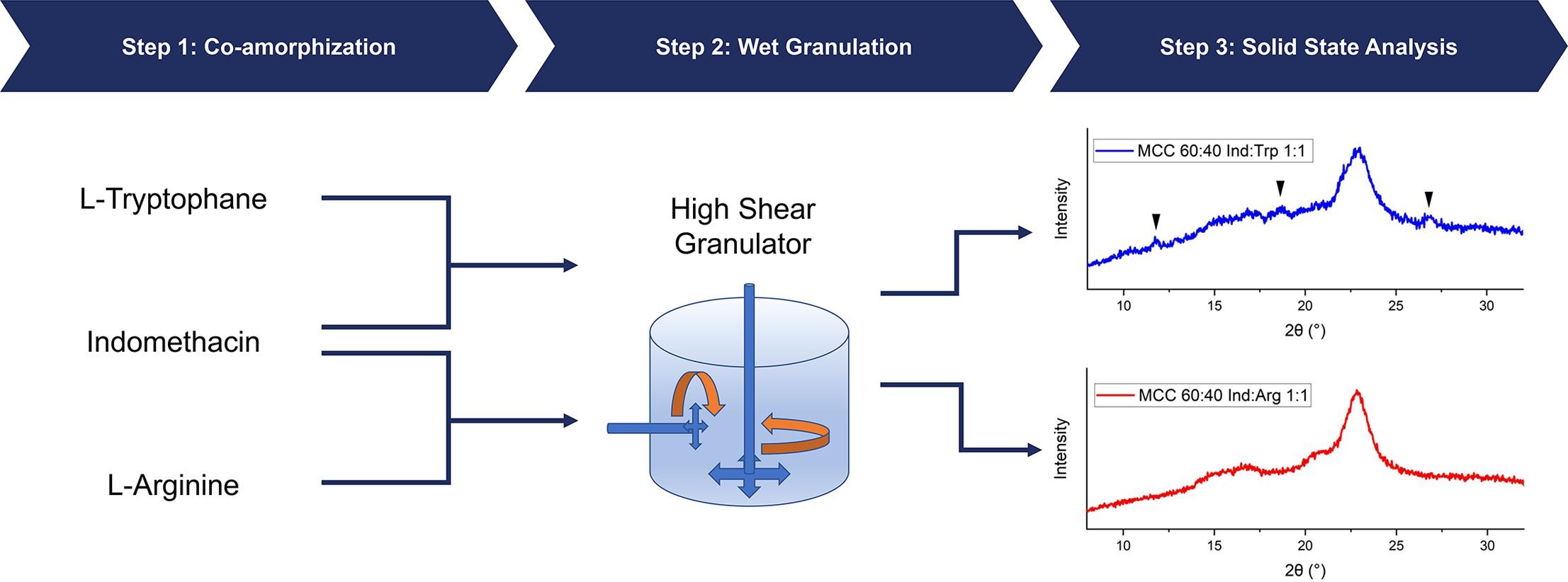Wet granulation of co-amorphous indomethacin systems

The feasibility of co-amorphous systems to be wet granulated together with microcrystalline cellulose (MCC) was investigated. Solid state and molecular interactions were analysed for various co-amorphous drug-amino acid formulations of indomethacin with tryptophan and arginine, respectively, via XRPD, DSC and FTIR. The co-amorphous binary systems were produced by ball-milling for 90 min at different molar ratios followed by wet granulation with MCC and water in a miniaturised scale. Tryptophan containing systems showed crystalline reflections in their XRPD diffractograms and endothermal events in their DSC analyses, and were therefore excluded from upscaling attempts. The systems containing arginine were found to be remain amorphous for at least ten months and were upscaled for production in a high-shear blender under application of two different parameter settings. Under the harsher instrument settings, a composition with a low MCC ratio experienced recrystallisation during wet granulation, while all other compositions could be successfully processed via wet granulation and stayed stable for a storage period of at least twelve weeks, indicating that wet granulation of co-amorphous systems can be feasible.
2.1. Material
Indomethacin (Ind) was obtained from Hovione Farmaciencia SA (Loures, Portugal). Tryptophan (Trp) was supplied by EMD Millipore Corporation (Burlington MA, USA) whereas arginine (Arg) was produced by Thermo Fischer Scientific (Kandel, Germany). The chemical structures of all three substances are shown in Fig. 1. The respective pKa values lie at 13.8 for the guanidine group of Arg (Fitch et al., 2015) and at 4.5 for the carboxylic acid moiety of Ind (O’Brien et al., 1984). The side chain of Trp has no potential for (de)protonation. The transfer or protons between Ind and Arg can lead to salt formation (Ojarinta et al., 2017).
Microcrystalline cellulose (MCC PH-102) was delivered by Roquette Brazil (Itapevi, Brazil). The Tg values of various amorphous systems were reported as follows: the Tg of an equimolar co-amorphous Ind:Arg system at 117.5 (±0.4) °C, the Tg of Ind at 36.70 (±0.8) °C and the Tg of Arg at 55 °C (Jensen et al., 2016a) as well as the Tg value for an equimolar co-amorphous Ind:Trp system at 90 °C (Jensen et al., 2016b).
Download the full study as PDF here: Wet granulation of co-amorphous indomethacin systems
or read it here
David Schütz, Annika Timmerhaus, Holger Grohganz, Wet granulation of co-amorphous indomethacin systems, International Journal of Pharmaceutics, Volume 644, 2023, 123318, ISSN 0378-5173,
https://doi.org/10.1016/j.ijpharm.2023.123318.

